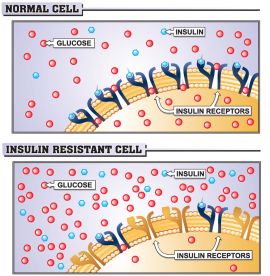PCOS and Your Sex Drive: What’s the Connection?

Having a low sex drive can very often be a cause for worry. Certainly, we all go through patches where our libido isn’t what it normally is, but a prolonged period of low sexual interest could be indicative of something serious. For example, a low sex drive can be the sign of depression or a related emotional disorder. Low sex drive can have other causes, as well, including fatigue and stress. It might also be the result of a hormonal imbalance—in particular, of PCOS (Polycystic Ovarian Syndrome).
Maybe you know PCOS (Polycystic Ovarian Syndrome) for a different set of reasons. For instance, you might know it the way most women do… as a condition that causes infertility or anovulation. Then again, you may be a woman suffering from this disorder, in which case you know full well the effects it can have on your menstrual cycle, leading to irregular or absent periods. You know firsthand how it can induce problems related to physical appearance, such as excess hair growth, unwanted hair loss, acne, or weight gain, or how it can alter your mental or emotional state. Indeed, given this set of symptoms, you probably have no trouble believing that Polycystic Ovarian Syndrome (PCOS) could also be the root cause of a diminished sex drive.
But as it happens, the precise link between Polycystic Ovarian Syndrome (PCOS) and the sexual dysfunction females of society face isn’t entirely clear. Indeed, there are many factors in play and research can sometimes be inconclusive. We’ll discuss some of the possible correlations between the two conditions, but before we do, let’s first remind ourselves of some of the pertinent, bedrock details of PCOS (Polycystic Ovarian Syndrome).
+ Click here to learn about the all natural PCOS 5-Element Solution
+ Click here to read more articles about PCOS and Sexual Health
Causes
A Matter of Insulin

We have already said that Polycystic Ovarian Syndrome (PCOS) or PCOD (Polycystic Ovary Disorder)is primarily a hormonal matter, and it is. But what causes the hormones to become so imbalanced? The answer in the majority of women with PCOS is a condition known as Insulin Resistance.
In this condition, your body loses its ability to properly utilize glucose in the bloodstream. When glucose does not enter the cells, thereby providing fuel, a disconnect occurs in which the pancreas releases more and more insulin in the hope it will enable glucose to do its job. This is called “compensatory hyperinsulinemia.” This elevated insulin level triggers the ovaries to produce an excessive level of sex hormones (especially androgens), and it can also stimulate increased cell growth in the basal cells of the skin resulting in acanthosis nigricans – the characteristic brown patches of skin sometimes found in the armpits and groin area in those with PCOS. Furthermore, insulin levels and glucose levels can continue to rise, leading to complications such as pre-diabetes, weight gain, abnormal lipid metabolism, and eventually impaired cardiovascular health.
And, of course, since the sex hormones are responsible for the regulation of so many bodily functions, it is not at all difficult to imagine how an imbalance might result in a variety of medical problems. For instance, an imbalance of male and female sex hormones is what leads to anovulation among many women who have PCOS (Polycystic Ovarian Syndrome). Elevated testosterone levels can lead to acne or excess hair growth, even male pattern baldness.1 And again, the presence of Insulin Resistance can lead to excess weight gain, obesity, and eventually high blood sugar, some of the most serious consequences of Polycystic Ovarian Syndrome (PCOS).
But what about a diminished sex drive? Is that a direct result of PCOS (Polycystic Ovarian Syndrome), or does it have more to do with some of these other symptoms? The connection might surprise you!
Symptoms
PCOS and Low Sex Drive: Is There a Connection?

According to some researchers, the connection between Polycystic Ovarian Syndrome (PCOS) and a diminished sex drive is tenuous, at best. In fact, some scientists say that a low sex drive women experience isn’t really a characteristic of Polycystic Ovarian Syndrome (PCOS) at all. One study concludes that a low libido is more common among sufferers of Cushing’s Syndrome, a condition that has many of the same symptoms as PCOS (Polycystic Ovarian Syndrome)—and that in fact, the presence of a low libido is a good reason to lean toward a Cushing’s diagnosis.2
On the other hand, the Institute of Psychiatry at the Federal University of Rio de Janeiro in Brazil did a study and concluded that, “The main factors of preservation of the sexual function in our sample were identified as the low average age of the patients in treatment and the hyperandrogenism habitually found as a consequence of the physiopathology of PCOS.”7 In short, they found a negative correlation between the scores of sexual satisfaction and higher levels of testosterone, regardless of the patients’ age. This finding clearly indicates that the symptoms of PCOS do have a negative impact on the sex drive of women.
What’s more, many women who have PCOS (Polycystic Ovarian Syndrome) tend to have hyperandrogenism, which means they have extremely high levels of the sex hormones called androgens.3 This condition is not associated with a low sex drive at all, but is, on the contrary, often marked by an increased sex drive. Also, according to a study at the University of Virginia, “Women with PCOS had a significantly lower orgasm/completion score compared with women in the control group.”6 In this study, they pointed to high serum testosterone levels as being the culprit when it came to female sexual dysfunction.
So why do many women who have Polycystic Ovarian Syndrome (PCOS) also suffer from a diminished sex drive? As far as symptoms go, the answer might be somewhat circuitous. In particular, there is ample evidence to suggest Polycystic Ovarian Syndrome (PCOS) is linked with depression, which in turn leads to a low sex drive.4 Likewise, PCOS often results in obesity, which can lead to fatigue, sleepiness, and stress—all factors in low libido.5
The bad news, then, is that, if you’re suffering from Polycystic Ovarian Syndrome (PCOS) and you have a decreased interest in sex, the two could well be related. But don’t lose heart. As it happens, it is very possible to manage the effects of PCOS fully. All you have to know is where to begin.
Natural Therapies
Curbing Insulin Resistance

We mentioned before that Insulin Resistance is an influencing factor in the majority of PCOS cases, and therein lies the key to managing these symptoms, including diminished libido. You see, as with any syndrome, the key to recovery is to remedy the root condition, not just the symptoms. Thus, the solution is not to focus on the effects, but on Insulin Resistance itself. And you can begin to manage this condition simply by embarking on a healthier lifestyle.
Is it going to be easy? Not necessarily. Certainly, it will require patience, endurance, accountability, and strategy. But it is a healthy and safe path to managing PCOS (Polycystic Ovarian Syndrome)—and of course, it’s effective, as well!
The first thing to consider is your diet. What are you putting into your body? Are you getting all of the nutrients and dietary essentials that you need to be healthy or are you filling up on junk? Try to focus, first and foremost, on protein; get a good, lean protein with every meal. Also boost your intake of vegetables. Fruits should be eaten in moderation, keeping in mind they are carbohydrates and your overall goal should be to decrease carbohydrates, especially refined carbs. Whole grains are better than refined grains, and stimulants, like coffee, are doing you a lot more harm than good. What else should you avoid? Processed foods, refined sugars, and foods with sugars added.
In addition to practicing good nutrition, of course, you will also want to exercise. We all know how hard it is to motivate ourselves to physical activity, so enlisting an accountability partner is a great measure to take. You might look into joining a local club that walks, runs, or swims together. Taking health club exercise classes is a good idea, too. Or, simply call some lady friends and arrange to go walking together once or twice a week!
Finally, look into the different resources made available by Insulite Health, such as our Nutritional Supplements and our individualized support program. We are pioneering the field of a healthy, natural approach to reversing PCOS (Polycystic Ovarian Syndrome), and we can give you the information you need for managing Insulin Resistance!
Treatment Options
What are My Options if the Insulite PCOS System does not Work?
The management of PCOS can include prescription medications. There are many feasible choices with regard to drug treatment options so it is essential to examine the benefits, side effects, and drug contradictions associated with each choice and discuss with your doctor what the best option is for you.
Some common prescription treatment options for PCOS are:
Oral contraceptives: ?This can be the first and most common method used to regulate the menstrual cycle. These pills are available in a range of types that contain a combination of hormones, usually estrogen plus progesterone or just progesterone. You need to go over with your doctor precisely what result you want when taking this drug before beginning a cycle.
menstrual cycle. These pills are available in a range of types that contain a combination of hormones, usually estrogen plus progesterone or just progesterone. You need to go over with your doctor precisely what result you want when taking this drug before beginning a cycle.
Metformin (Glucophage): ?Metformin is a drug that was produced for type-2 diabetics to increase insulin levels while controlling blood sugar. Since Insulin Resistance influences Polycystic Ovarian Syndrome this drug is utilized to treat PCOS also with successful outcomes. Metformin appears to minimize PCOS symptoms and frequently helps normalize male hormone levels as well as the menstrual cycle.
Male hormone blockers: ?These are generally used in combination with birth control pills to minimize unpleasant PCOS symptoms related to high levels of androgens. Birth control must be used in combination with these blockers due to the fact the blockers can cause birth defects in male fetuses. Some common choices of male hormone blockers are Flutamide, Finasteride, and Spironolactone.
Next Steps
- Take the PCOS Quiz! Get your score and assess your hormone health risks.
- Join our Facebook Sisterhood Group Pose your questions to this group of like-minded women. Get the answers to your questions and the support you need.
- Checkout the Hormone Reset. Guided Practices to eliminate anxiety, lose weight and boost energy.
We are committed to helping women reverse their symptoms of hormone imbalance – a major cause of excess weight gain, adult acne, unwanted facial hair, depression, anxiety, and heartbreaking female infertility.
©Insulite Health empowers women with hormone imbalance to transform their lives through a process of healing with the Natural Hormone Solution –a complete solution for helping women reverse the symptoms hormone imbalance..

